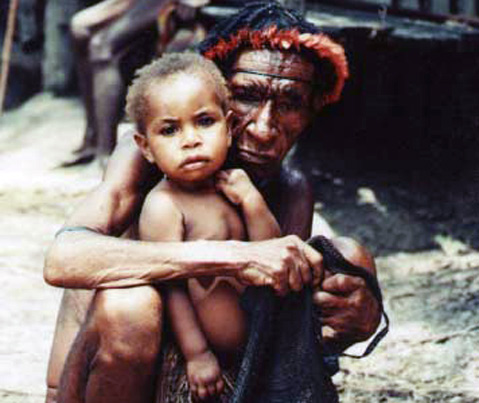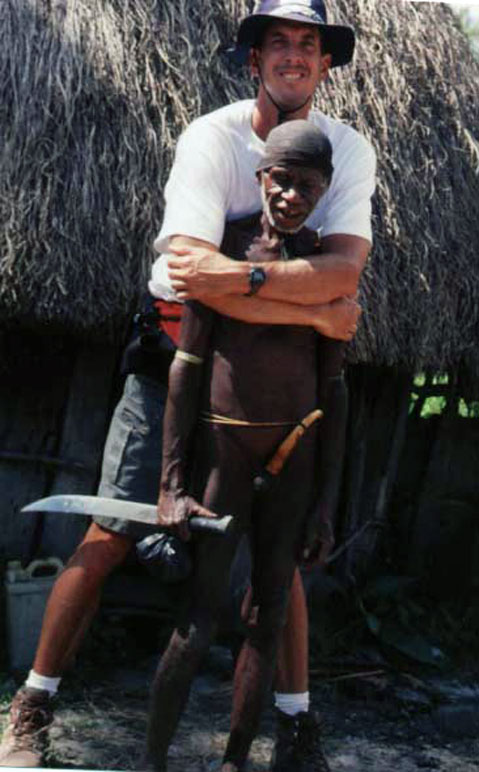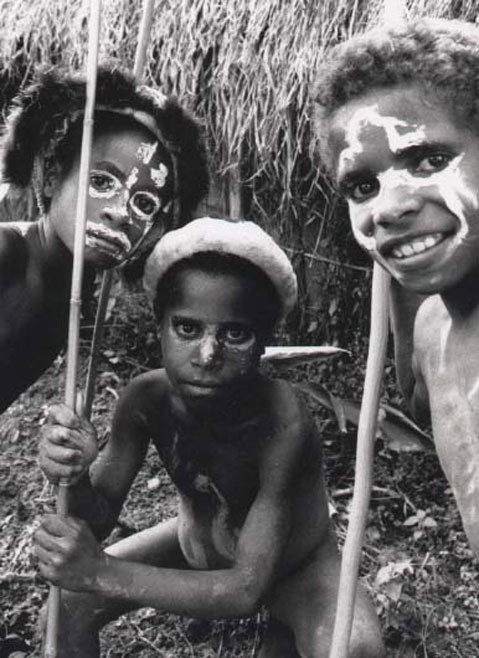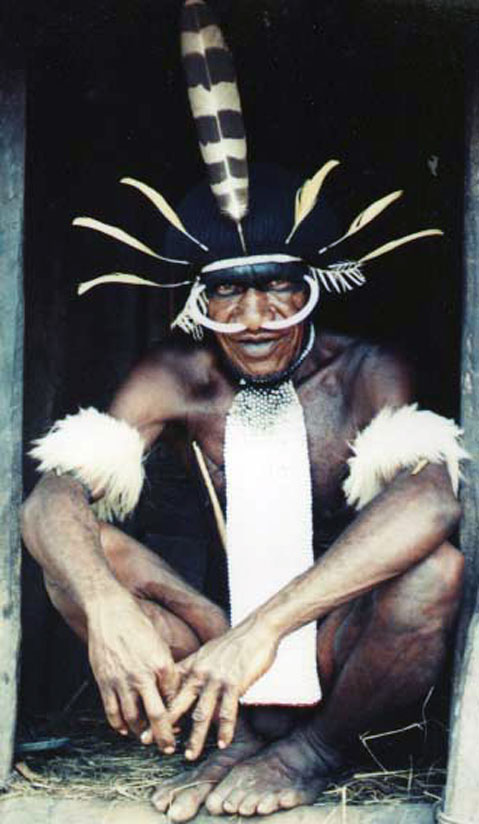The Better Angels
Friends Lighten a Life in Human Rights Work

I have been a human rights activist for the last 25 years. I’m now 56. My area of concern is West Papua, Indonesia’s 26th province. When I first arrived in Papua I was mesmerized by the beauty of the land and the kindness of the people. Their culture remains strong, which has been no small feat. The Indonesian government has tried to stomp on their traditional ways ever since Papua became a part of this vast archipelago.

National Geographic calls Papua “the most isolated frontier left in the world.” The men of these remote highland communities wear what’s called a holim, or penis gourd. Most men grow their own gourds according to their specific personalities. Some are curly and short, while others are long and slender. By hanging a rock on the vine at its early stage of growth, the gourd itself can take on many different forms. This tradition has been in practice for millennia, and the men had no desire to change this custom. However, the Indonesian government thought otherwise and decided the time had come for a different wardrobe.
So, under a government approved program called Operation Holim, numerous small planes took to the air; their mission was to drop thousands of pairs of jogging shorts onto the highlanders’ villages in the hope that they would find the new attire more to their liking. One week later, some of the planes retraced their flight pattern hoping to see the men wearing these shorts, but to their surprise the clothing was being worn on top of the villagers’ heads. It was decided by the tribal leaders that the shorts would make perfect head gear for protection from the rain. Keep in mind Papua receives over 300 inches of rain annually. And so goes the government’s attempt at change.
West Papua lies just south of the equator. It’s located on the island of New Guinea, split between the country of Papua New Guinea which lies to the east. It’s an immense island, twice the size of California with a population of roughly 2 million indigenous people and for the most part hidden from the world. It wasn’t until 1938 that the outside world discovered the central highlands of West Papua. For close to 50 years, since its incorporation into Indonesia, the people of this region have been waging a struggle for independence from Indonesian rule. Their dilemma is nothing short of genocide, as more than 200,000 Papuan lives have been lost.
But this article isn’t about the human rights abuses and torture that take place on a daily basis in an area most of us have never heard of. This article is about hope, desire, and humanity. It’s about people who I have met in my journey as an activist. People like John Rumbiak and Octo Mote, two Papuans living in the U.S. whom I admire deeply.
I first met John 15 years ago on a speaking tour in San Francisco. His endless passion to bring change to Papua hypnotized my soul. He spoke of his people not so much as being in a struggle with the Indonesian government but in a challenge. Not so much to be won but to be understood through humanity and good vs. evil. He was after all the ambassador for Papua, the voice of reason for a people whose world at times seemed to be turning upside down.

Before John became involved in human rights he was a community developer living in Jayapura, the capital of Papua. He would always talk to me about the curse of resources. Papua is abundant in natural resources: from the largest gold mine and third largest copper mine to vast amounts of timber and minerals. He would speak about multinationals’ disregard for the environment of Papua and their lack of concern for the indigenous population. “The French are looking for uranium. The Australians are surveying for gold. The British and Americans are looking for natural gas and oil. And the Japanese are logging. Papua is becoming the Siberia of Indonesia, a reserve of raw materials.”
For years John spent so much time on airlines flying from one place to another he considered planes a source of refuge for sleep. However, his fast-paced life took a toll and not long ago he suffered a stroke and is now unable to speak. He lives in New York and reads, emphatically staying caught up on events concerning Papua.
During those years before the stroke he founded Elsham, the first nongovernmental organization (NGO) human rights office in Papua. Now, there is an award given every year to the most deserving person or entity who has made a difference concerning Papua. Of course it’s called the “John Rumbiak Award” and there have been five recipients since its inception.
Octo and I met in 2000 at a human rights conference in Washington, D.C. We were both executive board members of Indonesian Human Rights Network, an NGO founded on bringing awareness to the U.S. concerning areas in Indonesia such as East Timor, West Papua, and Aceh.
Octo is like a brother to me. He has stayed with me many times in Santa Barbara and is my insight to the rapidly changing developments in Papua. In 2012 I spent two weeks at his home in Connecticut working on a documentary about his life. I finished the film six months later and called it No Choice. It’s about his endless passion for Papua, and the sacrifice as well as support from his family. We talk endlessly on the phone and text each other whenever something of importance takes place in Papua.
Octo is my support system. For at times the road as a human rights activist can be bumpy. Plenty of times I have walked out of board meetings shaking my head. Ideas and strategies that I thought might be of value could be quickly dismissed by the other members. Perhaps it was my approach or lack of it, but Octo would always be there. He would say, “Your heart is in a good place; continue just the way you always have; you’ll be understood, for in this journey there is no right or wrong.”
And now, years later, I for the most part enjoy the bumps. I use them as motivation to strive further.
In my hometown of Santa Barbara I have been blessed in meeting people who show a concern for Papua. People like Nick Welsh, Phyllisa Eisentraut, and the NGO Direct Relief.

I first talked to Nick about 15 years ago concerning Papua. I was pitching an article I had written and wanted to know if The Santa Barbara Independent would be interested; what better person to talk to than the executive editor of the paper? He politely listened to my delivery and asked that I refer to St Jude. When the conversation ended I quickly went to my computer to find information about this St Jude, the Catholic Patron Saint of “lost causes” and “cases despaired of.” When all other avenues are closed, he is the one to call upon, and his help often comes at the last moment.
I wasn’t sure of anything, perhaps Nick was St Jude in disguise or perhaps he was saying get lost. I continued to call him without being a nuisance. I think we enjoyed each other. I think. Then he gave the okay to send an outline of my proposal. Four months later it appeared in My Life section of The Independent.
A year or so later we met in his office. I had a gift for him from the rebel movement in Papua. I handed him a penis gourd in “appreciation of his concern regarding Papua.” Those were the words I was asked to relay from the movement. That gourd now hangs in his office, and every time I’m there I can’t help but smile.
I met Phyllisa through Jan Ford, both anthropology professors at SBCC. Jan unfortunately is no longer with us; he passed on a year ago. However, he gave me the opportunity to speak every semester in his cultural anthropology class back in 2003. In 2007 he introduced me to Phyllisa, head of the anthropology department. I now speak in her class as well as show my slides and films. It inspires me to have the opportunity to speak with students about a cause that is so close to my heart.
It was in the early ’90s when I approached Sue Fowler from Direct Relief, an NGO located in Goleta. For years they have been sending medical supplies to areas in need. Recently they have done unbelievable work in Haiti, Japan, and New Jersey — anywhere in the world where there have been natural disasters and urgent care is needed. Direct Relief would donate supplies that I would hand carry to Papua, where I would give them to one of the few clinics located in the highlands.
All of these people I consider prayers that have been answered: people who have stepped out to help a cause that is so worthy. They are all special to me and have been instrumental in bringing hope to a people who dream one day of becoming free.



